The joys and struggles of the toddler years may be behind you, but they’ve been replaced with a whole new set of challenges. Your child can now talk, but truly connecting through conversation can still be tricky. While the tantrums might be (mostly) gone, new behaviors can pop up, especially as sibling dynamics come into play.
- Top 5 Best Middle School Books of All Time
- Best Middle Grade Novels to Enjoy With Your Child – Top 4 Picks
Many parenting books promise to help you raise a well-behaved child, but the ones on this list go a step further. They offer practical strategies to strengthen your connection with your child, handle misbehavior with positivity, communicate more effectively, and feel less stressed and more confident in your role as a parent.
From “gentle parenting” to lessons from hunter-gatherer societies, here are some of the most highly praised parenting books for raising young children.
1. Good Inside: A Guide to Becoming the Parent You Want to Be by Dr. Becky Kennedy
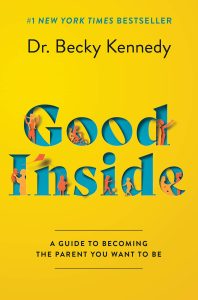
Dr. Becky Kennedy is a star in the “gentle parenting” movement, and her book is particularly helpful for parents of young children. Her core idea is simple: there are no bad kids. Every child (and parent!) is “good inside,” even when their behavior suggests otherwise. The book encourages parents to respond to unwanted behaviors by trying to understand the child’s unmet needs and then setting boundaries with empathy.
Dr. Becky excels at using real-life examples and provides sample scripts that are easy to use. While her methods aren’t for everyone, many parents swear by her advice. If you’re looking for a new perspective on parenting, this book is a great place to start.
2. How to Talk So Little Kids Will Listen: A Survival Guide to Life With Children Ages 2-7 by Joanna Faber and Julie King
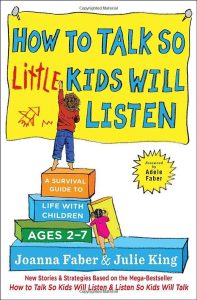
This book is a fantastic guide to communicating with young children, building on the classic How to Talk So Kids Will Listen. Authors Faber and King focus on the importance of cooperation and connection built on mutual respect. They argue that yelling, bribing, and punishing are counterproductive.
Instead, they provide a framework for positive communication, such as acknowledging and validating your child’s feelings, giving them choices to feel in control, and using playfulness to solve problems. A key takeaway is to model the kind of communication you want your children to learn. This book is a life-saver for parents who feel like they’re constantly hitting a communication wall.
3. Siblings Without Rivalry: How to Help Your Children Live Together So You Can Live Too by Adele Faber and Elaine Mazlish
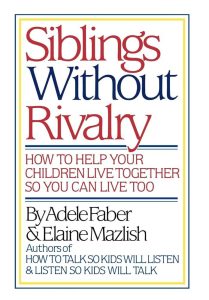
While not just for preschoolers, this book becomes essential once you have more than one child. Authors Faber and Mazlish make it clear that the goal isn’t to eliminate all rivalry—which is natural—but to teach parents how to manage conflict in a healthy way.
The book is filled with relatable stories, cartoons, and sample scripts. You’ll learn strategies like avoiding comparisons between children, acknowledging each child’s individual feelings, and encouraging cooperation instead of competition. The authors’ approachable style makes their lessons easy to understand and put into practice, providing a solid foundation for a healthy sibling relationship.
4. The Whole-Brain Child by Daniel J. Siegel and Tina Payne Bryson
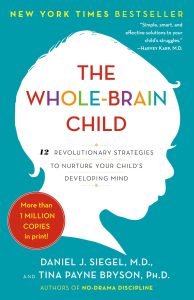
This book helps parents understand how their children’s brains work. It’s particularly useful for preschoolers, who are still developing the logical parts of their brains and tend to act on emotion and impulse. Siegel and Payne Bryson explain that kids aren’t “bad”; their brains are just still under construction.
The book offers 12 core strategies for helping kids learn to self-regulate their emotions and build emotional intelligence. The advice is practical and easy to implement, like using physical movement to help calm the nervous system or teaching your child to reflect on past events when they are calm. These are valuable skills that will benefit children far beyond the preschool years.
5. Hunt, Gather, Parent by Michaeleen Doucleff
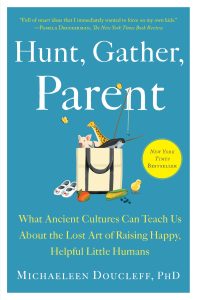
If you’re looking for a completely different approach, this book is for you. Author Michaeleen Doucleff was fascinated by the parenting methods of traditional cultures, like the Maya and the Inuit. After living with these communities, she argues that modern Western parents can learn to be less anxious and raise calmer, more cooperative children.
The book’s core ideas are to trust children from a young age, integrate them into adult life by giving them meaningful tasks, and be a calm, non-reactive authority figure. While some of the advice might be hard to apply in a modern city (like letting a small child run errands alone), the smaller lessons are powerful and can help you reconsider what’s truly important in parenting.
All of these books are incredibly beneficial for parents of young children. These early years are a great time to build a strong foundation for communication, positive family relationships, and emotional intelligence. If you’re still searching for the parenting strategies that work best for your family, these five books may provide the valuable insight you need.